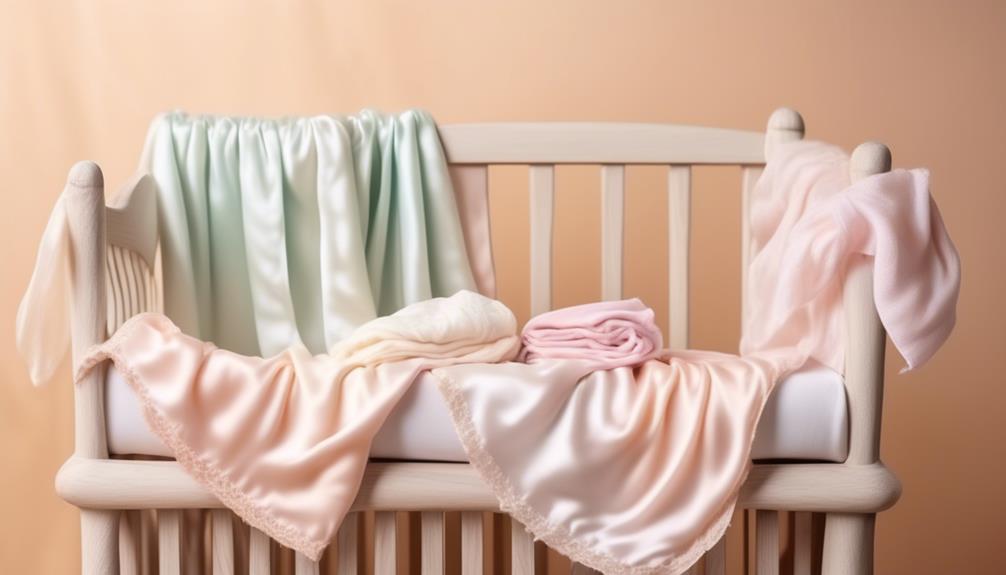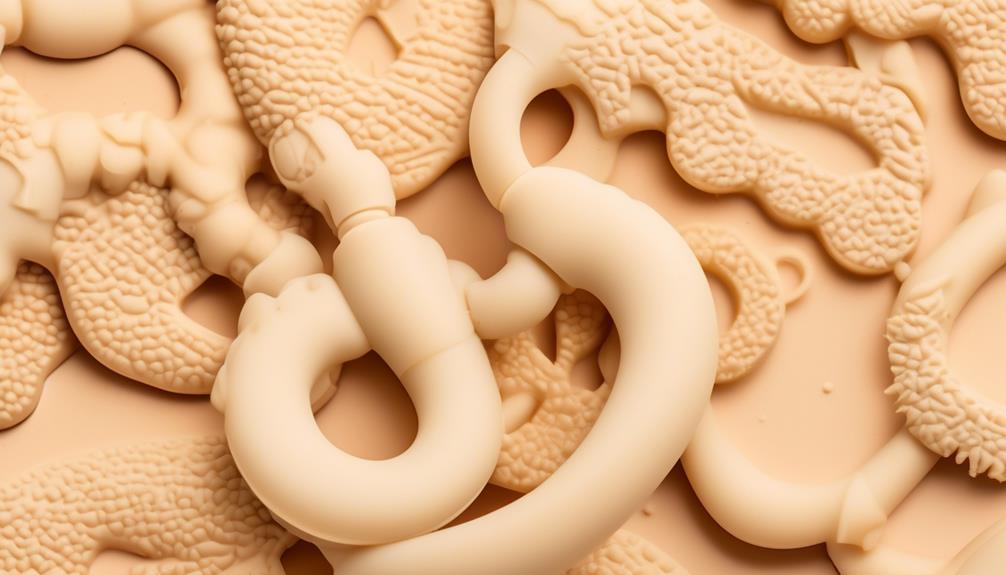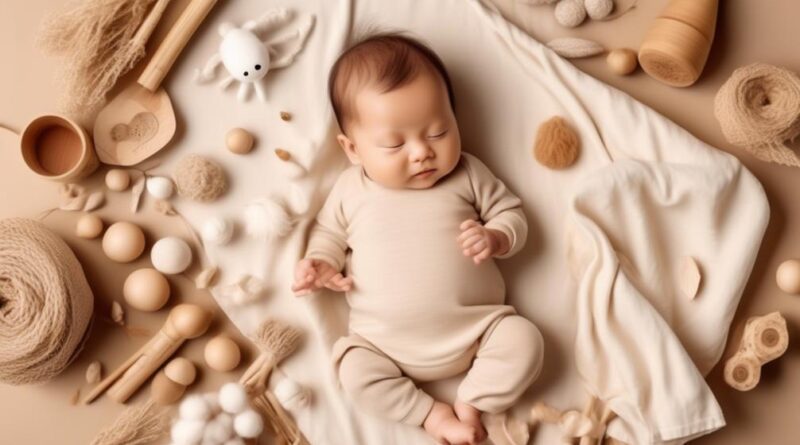Why Choose Natural Materials for Baby Products?
When it comes to choosing materials for your baby products, think of natural materials like a gentle breeze on a hot summer day.
The decision to opt for natural materials over synthetic ones is not just a trend, but a conscious choice that can greatly impact your baby's comfort, health, and overall well-being.
But what is it about natural materials that make them so appealing for your little one's products?
Let's explore the benefits and reasons behind this growing preference.
Organic Cotton
When looking for natural materials for baby products, organic cotton is an excellent choice due to its softness, breathability, and absence of harmful chemicals. When compared to conventional cotton, organic cotton has a significantly lower environmental impact. It's grown using methods and materials that have a low impact on the environment. These methods exclude the use of synthetic chemicals and genetically modified seeds, which not only benefits the environment but also the farmers and their communities.
For baby clothing, fabric choices are crucial. Organic cotton provides numerous benefits for your baby. Its soft and breathable nature makes it perfect for a baby's delicate skin. Additionally, organic cotton is hypoallergenic, reducing the risk of skin allergies and irritations, which is especially important for babies with sensitive skin. The absence of harmful chemicals in organic cotton also ensures that your baby isn't exposed to any potentially toxic substances.
Choosing organic cotton for your baby's clothing not only benefits your little one but also contributes to a more sustainable and eco-friendly world. By supporting organic cotton production, you're promoting better soil health, reducing water consumption, and minimizing the use of harmful chemicals. Ultimately, opting for organic cotton for your baby's clothing is a thoughtful choice that prioritizes both the well-being of your baby and the environment.
Bamboo
Choosing bamboo for your baby's products offers a sustainable and eco-friendly alternative to traditional materials. Bamboo is one of the most eco-friendly alternatives for baby products due to its sustainable manufacturing processes and numerous benefits.
When compared to traditional materials like plastic or cotton, bamboo stands out as a renewable resource that grows quickly and requires minimal water and no pesticides. This makes it an excellent choice for eco-conscious parents who want to minimize their baby's environmental footprint.
Bamboo's sustainable manufacturing processes make it an ideal option for baby products. It grows rapidly and doesn't require replanting after harvest, making it highly sustainable. Additionally, bamboo forests can help reduce carbon dioxide levels in the atmosphere, contributing to environmental conservation. The manufacturing of bamboo-based products also often involves minimal chemical processing, reducing the environmental impact further. This means that when you choose bamboo for your baby's products, you're making a choice that aligns with eco-friendly and sustainable practices.
Furthermore, bamboo has natural antimicrobial properties, reducing the need for harsh chemical treatments that are often used on other materials. This makes bamboo products a safe and healthy choice for your baby.
From bamboo baby clothes to bedding and towels, there's a wide range of baby products made from this sustainable material, offering comfort, durability, and peace of mind for eco-conscious parents.
Hemp
Bamboo's eco-friendly properties make it a popular choice for baby products, and now let's explore how hemp can offer similar sustainability benefits for your baby's items.
Hemp, a natural and versatile material, is gaining attention for its eco-friendly features, making it an excellent option for baby products. Here's why hemp is an ideal choice for your little one:
- Sustainable Farming
Hemp is known for its minimal impact on the environment during cultivation. It requires significantly less water compared to other crops and can grow in a variety of climates. This makes hemp a sustainable choice for baby products, as it reduces the strain on water resources and promotes environmentally friendly farming practices.
- Environmental Benefits
Hemp plants have deep roots that help prevent soil erosion, making it an excellent crop for promoting soil health. Additionally, hemp cultivation doesn't typically require pesticides or herbicides, reducing the chemical load on the environment. Choosing hemp-based baby products can contribute to a healthier planet for future generations.
- Versatility
Hemp fibers are durable and breathable, making them suitable for various baby products such as clothing, blankets, and diapers. The strength of hemp fibers ensures longevity, reducing the need for frequent replacements and ultimately minimizing waste.
Incorporating hemp-based baby products into your child's daily life not only supports sustainable farming practices but also ensures that your little one is surrounded by natural, eco-friendly materials that promote a healthier planet.
Wool
The natural properties of wool make it an excellent choice for baby products, providing warmth and comfort without compromising sustainability. Wool is a versatile and beneficial material for baby products due to its natural insulation and breathability, making it ideal for regulating body temperature and keeping your baby snug in both warm and cool weather. Wool fibers have a unique ability to absorb moisture, keeping your baby dry and comfortable. Additionally, wool is naturally hypoallergenic, making it gentle on sensitive baby skin and reducing the risk of irritation or allergic reactions.
There are numerous benefits of using wool for baby products. Wool is naturally flame-resistant, providing an extra layer of safety for your little one. It's also a durable material that can withstand frequent washing and maintain its shape and quality over time.
When caring for wool baby products, it's important to follow specific care instructions. Hand washing with a gentle detergent is often recommended to maintain the integrity of the wool fibers. Avoid using hot water or harsh chemicals that can cause shrinkage or damage to the wool. Air drying is the best method for preserving the shape and texture of wool products. Additionally, using a gentle brush can help remove any pilling that may occur over time, keeping the wool baby products soft and smooth for your little one.
Silk

Consider incorporating silk into your baby's products for its luxurious feel and natural hypoallergenic properties. Silk is a natural protein fiber that offers various benefits, making it an excellent choice for your little one's comfort and well-being. Here's why silk is a great option for your baby:
- Silk Benefits
- Gentle on the Skin: Silk is incredibly soft and smooth, making it gentle and non-abrasive on delicate baby skin, reducing the risk of irritation or rashes.
- Temperature Regulating: Silk has natural temperature-regulating properties, keeping your baby cool in warm weather and warm in cooler temperatures, promoting better sleep and overall comfort.
- Hypoallergenic: Silk is naturally hypoallergenic, resisting dust mites, mold, and mildew, making it an ideal choice for babies with sensitive skin or allergies.
- Silk Care Instructions
- Handwashing: To maintain the integrity of silk fibers, handwashing in cold water with a gentle detergent is recommended. Avoid wringing or twisting the fabric.
- Drying: Lay silk items flat on a towel to air dry. Avoid direct sunlight and heat, as they can damage the silk fibers.
- Storage: Store silk items in a cool, dry place to prevent moisture build-up and potential damage to the fabric.
Incorporating silk into your baby's products can provide a luxurious and comfortable experience while also offering natural hypoallergenic properties that contribute to your baby's overall well-being. Remember to follow the care instructions to ensure the longevity of silk items for your little one.
Linen
When selecting materials for your baby's products, linen offers a breathable and durable option that's well-suited for their comfort and safety. Linen is a natural fiber made from the flax plant, and it has numerous benefits that make it a great choice for your baby's items.
Linen is highly absorbent, which means it can wick away moisture, keeping your baby dry and comfortable. It's also hypoallergenic, making it gentle on sensitive baby skin and reducing the risk of any allergic reactions. Additionally, linen is known for its durability, so you can trust that it will withstand the wear and tear that comes with baby products.
When it comes to caring for linen baby products, there are a few tips to keep in mind. To maintain the quality of linen items, it's best to wash them in lukewarm or cold water, as hot water can cause shrinkage. Use a gentle cycle and a mild detergent to avoid damaging the fabric. You can air dry linen products or tumble dry on low heat to prevent excessive wrinkling. If wrinkles do occur, a quick ironing on the linen setting can smooth them out.
Proper care will ensure that your baby's linen items remain soft, breathable, and comfortable.
Rubber

As you explore natural materials for your baby's products, you'll find that rubber offers unique properties that can contribute to your baby's comfort and safety.
When it comes to baby products, rubber can be a great choice due to its durability, flexibility, and non-toxic nature. Here are some reasons why rubber can be an excellent option for your baby:
- Rubber teething toys
Rubber teething toys are a popular choice for parents who want to provide their babies with a safe and natural option for soothing their teething discomfort. Rubber's soft and pliable texture makes it gentle on your baby's gums while providing a satisfying chewing experience. Additionally, rubber teething toys are easy to clean, making them a hygienic choice for your little one.
- Rubber diaper covers
When it comes to diapering, rubber diaper covers offer excellent leak protection and breathability. Rubber is naturally waterproof, which can help prevent leakage and keep your baby's clothing dry. Moreover, the elastic and stretchy nature of rubber ensures a comfortable fit for your baby, allowing for freedom of movement without causing any discomfort.
Wood
Wooden baby products, such as cribs and toys, offer a natural and sturdy alternative to synthetic materials, ensuring both safety and sustainability for your little one. Wood is a timeless choice for baby products due to its sustainable production and eco-friendly nature.
The durability of wooden baby items ensures that they can withstand the wear and tear of everyday use, providing long-lasting value for your family. Wood is sourced from renewable forests, making it an environmentally conscious choice. Unlike plastic or metal, wooden baby products are biodegradable, reducing environmental impact.
Additionally, the natural beauty of wood adds a touch of warmth and charm to your baby's environment, creating a soothing and nurturing atmosphere. When choosing wooden baby products, look for those made from responsibly sourced wood to ensure sustainable production practices. Many manufacturers prioritize eco-friendly methods and materials, further contributing to the positive environmental impact of wooden baby items.
Furthermore, wooden toys can stimulate a child's senses with their unique textures and earthy tones, providing a sensory experience that's unparalleled by synthetic materials. The sturdiness of wooden cribs also offers peace of mind, knowing that your little one is secure in a reliable and robust sleeping environment.
Frequently Asked Questions
Are Natural Materials Like Organic Cotton, Bamboo, Hemp, Wool, Silk, Linen, Rubber, and Wood Safe for Babies With Sensitive Skin or Allergies?
When it comes to sensitive skin and allergies, natural materials like organic cotton, bamboo, hemp, wool, silk, linen, rubber, and wood are safe for babies. These materials are gentle, breathable, and less likely to cause irritation. They're also less likely to contain harsh chemicals, making them a safer choice for baby products.
Always prioritize baby product safety by choosing natural materials that are hypoallergenic and gentle on sensitive skin.
How Should Natural Materials Like Organic Cotton, Bamboo, Hemp, Wool, Silk, Linen, Rubber, and Wood Be Properly Cared for to Ensure They Remain Safe for Babies?
To properly care for natural materials like organic cotton, bamboo, hemp, wool, silk, linen, rubber, and wood for your baby products, start with proper storage. Keep them in a dry, well-ventilated area to prevent mold and mildew.
When it's time to clean, opt for eco-friendly methods and organic dye to maintain their safety.
Ensure sustainable sourcing for these materials to support ethical and environmentally friendly practices.
Can Natural Materials Like Organic Cotton, Bamboo, Hemp, Wool, Silk, Linen, Rubber, and Wood Withstand Frequent Washing and Cleaning?
Natural materials like organic cotton, bamboo, hemp, wool, silk, linen, rubber, and wood can withstand frequent washing and cleaning. They're durable and can maintain their quality with regular care.
Washing frequency and proper maintenance are key to ensuring their longevity. By following care instructions and using gentle, natural cleaning products, you can keep these materials in good condition for your baby's use.
Are There Any Specific Certifications or Standards to Look for When Purchasing Baby Products Made From Natural Materials Like Organic Cotton, Bamboo, Hemp, Wool, Silk, Linen, Rubber, and Wood?
When buying baby products made from natural materials like organic cotton, bamboo, hemp, wool, silk, linen, rubber, and wood, it's crucial to look for specific certifications and standards.
Ensure the materials meet safety and sustainability impact requirements. Look for certifications like GOTS for organic cotton and OEKO-TEX for textile safety.
Check for sourcing ethics and sustainable practices to make informed and responsible choices for your baby's well-being.
Are There Any Potential Environmental or Ethical Concerns Associated With the Production and Sourcing of Natural Materials Like Organic Cotton, Bamboo, Hemp, Wool, Silk, Linen, Rubber, and Wood for Baby Products?
When considering natural materials for baby products, it's essential to look into sourcing sustainability and ethical concerns.
The production process of materials like organic cotton, bamboo, hemp, wool, silk, linen, rubber, and wood can have potential environmental impacts and ethical considerations.
It's important to research and choose products made from responsibly sourced materials to minimize environmental harm and ensure ethical production practices.
Conclusion
When it comes to choosing baby products, natural materials are the best choice for your little one's health and well-being.
From organic cotton to bamboo, hemp, wool, silk, linen, rubber, and wood, these materials are gentle on baby's delicate skin and free from harmful chemicals.
By choosing natural materials, you're providing a safe and comfortable environment for your baby, while also making a positive impact on the environment.
Make the switch to natural materials for a healthier and happier baby.
